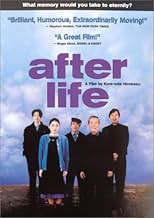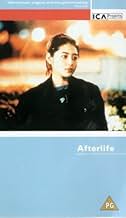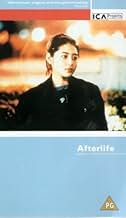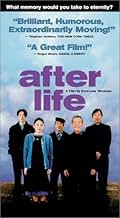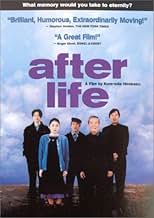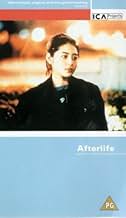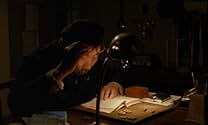IMDb रेटिंग
7.6/10
15 हज़ार
आपकी रेटिंग
मृत्यु के बाद, लोगों के पास एक सप्ताह है, केवल एक स्मृति को चुनने के लिए जिसे वो अनंत काल तक रख सके.मृत्यु के बाद, लोगों के पास एक सप्ताह है, केवल एक स्मृति को चुनने के लिए जिसे वो अनंत काल तक रख सके.मृत्यु के बाद, लोगों के पास एक सप्ताह है, केवल एक स्मृति को चुनने के लिए जिसे वो अनंत काल तक रख सके.
- पुरस्कार
- 7 जीत और कुल 8 नामांकन
Arata Iura
- Takashi Mochizuki, counselor
- (as Arata)
फ़ीचर्ड समीक्षाएं
10Ben-113
I really loved Kore-eda's first feature "Maboroshi No Hikari", so I had been looking forward very much to seeing "Afterlife" (named "Wandafuru raifu" in Japanese, after Frank Capra's movie "It's a wonderful Life") during its run in London.
At first I noticed that the film is formally very different from its predecessor; while "Maboroshi No Hikari" owes much to the influence of Ozu, and especially Hou Hsiao-hsien, "Afterlife" draws more on the directors background as a documentary filmmaker. What the two films share, however, is the theme of memory (Note: also a theme with Hirokazu Kore-eda's documentary work - check out "Without Memory", about a man suffering of severe amnesia). In "Maboroshi No Hikari" Yumiko is not able to forget the memory of her dead husband, whereas in "Afterlife" the recently deceased must chose one memory that will accompany them into eternity.
I feel that Kore-eda handles this entirely hypothetical premise in the best possible way, by steering completely clear of the stylistic superficialities with which so many other films about life after death desperately try to make themselves believable. The unspectacular old school building as a setting, the ceiling window with its interchangeable templates for the different stages of the moon, a character who himself has doubts as to whether this is really the best way of going to the next world and the absence of any religious connotations, among other things, all serve to keep the focus on the characters and their memories - many of whom are actually real. Apart from tongue in cheek humour, the lack of music also prevents over-sentimentalization and makes the memories the people recall the more sincere. The no-budget filming of the recollections of the deceased in order to trigger their personal memory, toward the end of the movie, also illustrates that the director is fully aware of his own limitations and possibilities as a film-maker. Rather than just trying to create the illusion of some half-baked version of the hereafter, he wants to challenge the viewer to reflect on what would be his/her most important memory - and succeeds in every way.
This is a movie that surly can be appreciated by anyone who possesses at least a tiniest inkling of openness and willingness to experience cinema as more than mere entertainment. Top mark for this one!
At first I noticed that the film is formally very different from its predecessor; while "Maboroshi No Hikari" owes much to the influence of Ozu, and especially Hou Hsiao-hsien, "Afterlife" draws more on the directors background as a documentary filmmaker. What the two films share, however, is the theme of memory (Note: also a theme with Hirokazu Kore-eda's documentary work - check out "Without Memory", about a man suffering of severe amnesia). In "Maboroshi No Hikari" Yumiko is not able to forget the memory of her dead husband, whereas in "Afterlife" the recently deceased must chose one memory that will accompany them into eternity.
I feel that Kore-eda handles this entirely hypothetical premise in the best possible way, by steering completely clear of the stylistic superficialities with which so many other films about life after death desperately try to make themselves believable. The unspectacular old school building as a setting, the ceiling window with its interchangeable templates for the different stages of the moon, a character who himself has doubts as to whether this is really the best way of going to the next world and the absence of any religious connotations, among other things, all serve to keep the focus on the characters and their memories - many of whom are actually real. Apart from tongue in cheek humour, the lack of music also prevents over-sentimentalization and makes the memories the people recall the more sincere. The no-budget filming of the recollections of the deceased in order to trigger their personal memory, toward the end of the movie, also illustrates that the director is fully aware of his own limitations and possibilities as a film-maker. Rather than just trying to create the illusion of some half-baked version of the hereafter, he wants to challenge the viewer to reflect on what would be his/her most important memory - and succeeds in every way.
This is a movie that surly can be appreciated by anyone who possesses at least a tiniest inkling of openness and willingness to experience cinema as more than mere entertainment. Top mark for this one!
Every Monday morning, a team of advisors welcome in a facility a group of people that has just died with the mission of helping each one of them to select their best memory that will last for the eternity in the first three days. On Thursday, filmmakers begin to recreate the selected memory, and in the end of the week they screen it in a movie theater and he or she moves to Heaven.
I bought "Wandâfuru Raifu", or "After Life" on DVD, since I was very intrigued with the summary on its cover. I saw this low budget movie spoken in Japanese with English subtitles and I found the story very original and provocative. The premise of rebuilding eternity along a week, like God created Earth, and Heaven be a projection of a movie of the best memory one could have, is fantastic. In spite of having unexplained points, like for example the need itself of lasting with only one single memory, and inconsistencies, like why the need of shooting the memory, if the staff can bring videotapes of the entire life, what matters is the originality of this unique movie. One point that has always impressed me in cinema is the fact the actors and actresses last forever in the eyes of the audiences along generations. In this movie, each one of us has the chance to be an actor or actress, and write our own screenplay. Further, I personally recalled many good moments of my life just because of the storyline of this movie, and I found how difficult it could be to select only one good moment of my life to last forever. My vote is seven.
Title (Brazil): "Depois da Vida" ("After Life")
I bought "Wandâfuru Raifu", or "After Life" on DVD, since I was very intrigued with the summary on its cover. I saw this low budget movie spoken in Japanese with English subtitles and I found the story very original and provocative. The premise of rebuilding eternity along a week, like God created Earth, and Heaven be a projection of a movie of the best memory one could have, is fantastic. In spite of having unexplained points, like for example the need itself of lasting with only one single memory, and inconsistencies, like why the need of shooting the memory, if the staff can bring videotapes of the entire life, what matters is the originality of this unique movie. One point that has always impressed me in cinema is the fact the actors and actresses last forever in the eyes of the audiences along generations. In this movie, each one of us has the chance to be an actor or actress, and write our own screenplay. Further, I personally recalled many good moments of my life just because of the storyline of this movie, and I found how difficult it could be to select only one good moment of my life to last forever. My vote is seven.
Title (Brazil): "Depois da Vida" ("After Life")
This was a perfect film for watching on a quiet Sunday morning. It made me reflect on my own life, and realize that I would probably be one of the counselors in the afterlife.
It was brilliantly written and directed and one of the most innovative stories I have seen on screen. After death, you spend a week in a way-station to reflect on your life and take one memory with you. It is not an easy process as I discovered.
I was interested in the fact that some people can remember all the way back to the womb. Picking a happy memory before I was an adult is almost impossible for me, so I cannot imagine going back that far. Most people remember only to age three or four.
I was fascinated with the man who wanted to leave behind some evidence of his existence. One man could not remember any happy memories in his 70+ years, so he had to sit through video tapes, one for each year of his life, to help him. It seems that there was a connection with one of the counselors and this played out in an unusual way at the end. Choosing your best memory as the fact that you were someone else's best memory and that you made one person happy.
Most of us fall into the category expressed by one man. "I had a so-so education, a so-so job, a so-so marriage, and a so-so retirement." How do you pick a happy or important memory from that? I also liked one man's response when he picked his memory after lamenting that most of the memories of his life were bad. After being told he would forget all the bad memories, he exclaimed, "That truly is heaven." An unusual film that will be in my memory for a long time.
It was brilliantly written and directed and one of the most innovative stories I have seen on screen. After death, you spend a week in a way-station to reflect on your life and take one memory with you. It is not an easy process as I discovered.
I was interested in the fact that some people can remember all the way back to the womb. Picking a happy memory before I was an adult is almost impossible for me, so I cannot imagine going back that far. Most people remember only to age three or four.
I was fascinated with the man who wanted to leave behind some evidence of his existence. One man could not remember any happy memories in his 70+ years, so he had to sit through video tapes, one for each year of his life, to help him. It seems that there was a connection with one of the counselors and this played out in an unusual way at the end. Choosing your best memory as the fact that you were someone else's best memory and that you made one person happy.
Most of us fall into the category expressed by one man. "I had a so-so education, a so-so job, a so-so marriage, and a so-so retirement." How do you pick a happy or important memory from that? I also liked one man's response when he picked his memory after lamenting that most of the memories of his life were bad. After being told he would forget all the bad memories, he exclaimed, "That truly is heaven." An unusual film that will be in my memory for a long time.
I saw this movie in the theatre. It is always a pleasure to be at a viewing where there is spontaneous applause at the end. This is one of those movies. It speaks to your very soul. I understand that quite a few of the cast were not professional actors, but spoke from their own lifetime experiences. There is a very simple premise: you get to choose the most favourite moment of your life after you are dead and then help to recreate it, staging, cast of characters, scene - and the total non-professional manufacturing of this moment I found very touching - so that it can be savoured for all eternity. The perfect heaven. Of course some recently dead people can't think of anything, some remember very simple things, some are given assistance, like the record of their entire life in video form to review and extract a memory, if they can. The cast and direction is brilliant. I shudder to think of what modern Hollywood would do with this ("What dreams may come" being a case in point). It was all extremely simple and believable and has certainly had me talking about it for quite a while since I have seen it. 8 out of 10.
9KFL
The Afterlife is best thought of as a kind of thought experiment, perhaps in the same vein as Groundhog Day. The point is not that this may be what we experience after death; it is rather that we need to think more about what it is in this life that we'd really like to keep with us forever.
This point needs emphasis. When asked what we want most in life, most of us will talk about our career, or a business venture perhaps, or some other accomplishment. This movie suggests that these kinds of things may not, at the end of the day, be so important as some other experiences we may have. In any case, it challenges us to rethink what it is we really value.
Some reviewers complain about the quite ordinary surroundings and "poor production values" of the movie. I prefer to think of the choice of sets etc as humble and realistic. Could any movie, whatever its budget, ever possibly do justice to this subject matter?
Much of this movie is devoted to explorations of the lives of a number of rather ordinary people, trying to identify their most cherished memories. Some reviewers have condemned The Afterlife as boring, boring, BORING on this account. It all depends on whether other people interest you. If all you want to see is car chases, sex, explosions, cool special effects,...avoid this movie. Only, it's worth noting that the lives and thoughts of others may help us to better understand ourselves. And nowhere more so than in this movie.
This point needs emphasis. When asked what we want most in life, most of us will talk about our career, or a business venture perhaps, or some other accomplishment. This movie suggests that these kinds of things may not, at the end of the day, be so important as some other experiences we may have. In any case, it challenges us to rethink what it is we really value.
Some reviewers complain about the quite ordinary surroundings and "poor production values" of the movie. I prefer to think of the choice of sets etc as humble and realistic. Could any movie, whatever its budget, ever possibly do justice to this subject matter?
Much of this movie is devoted to explorations of the lives of a number of rather ordinary people, trying to identify their most cherished memories. Some reviewers have condemned The Afterlife as boring, boring, BORING on this account. It all depends on whether other people interest you. If all you want to see is car chases, sex, explosions, cool special effects,...avoid this movie. Only, it's worth noting that the lives and thoughts of others may help us to better understand ourselves. And nowhere more so than in this movie.
क्या आपको पता है
- ट्रिवियाMuch of the action in After Life is shown as interviews conducted with the recently deceased regarding their lives. Some of these interviews were scripted, but many were done impromptu, with real people (not actors) reminiscing about their own lives.
- भाव
Kenji Yamamoto, who wants to forget his past: Say I choose a memory, from when I was eight or ten years old. Then I'll only remember how I felt back then? I'll be able to forget everything else? Really? You can forget? Well, then that really is heaven.
टॉप पसंद
रेटिंग देने के लिए साइन-इन करें और वैयक्तिकृत सुझावों के लिए वॉचलिस्ट करें
- How long is After Life?Alexa द्वारा संचालित
विवरण
बॉक्स ऑफ़िस
- US और कनाडा में सकल
- $8,01,985
- US और कनाडा में पहले सप्ताह में कुल कमाई
- $11,791
- 16 मई 1999
- दुनिया भर में सकल
- $8,01,985
इस पेज में योगदान दें
किसी बदलाव का सुझाव दें या अनुपलब्ध कॉन्टेंट जोड़ें




